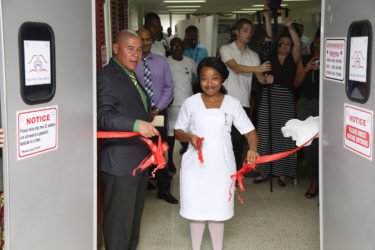In the early 2000s, it cost US$500,000 for 10 patients to receive cardiac treatment overseas. Today, the same service can be provided for 100 patients for that same cost at the Georgetown Public Hospital Corporation (GPHC).
One step in realising this breakthrough is the commissioning of the country’s first Cardiac Intensive Care Unit (CICU), which can house up to eight cardiac patients in need of acute care.
The unit will provide free to the Guyanese public acute care services, such as a heart failure clinic, cardiac catheterisation, electrocardiogram or ECG testing, stress testing echocardiogram, and angiogram. It will also provide referrals for surgeries, at a subsidised cost to the Caribbean Heart Institute (CHI) a public/private partnership housed in the GPHC compound.

According to Minister of Public Health Dr George Norton, the fact that cardiovascular diseases are the number one cause of death in Guyana has made the government cognisant of the importance of providing the best quality cardiac care.
“The opening of this, the first public cardiac care unit in the Caribbean, is a pivotal step in decreasing the number of deaths caused by cardiovascular disease in our beloved country,” Norton said. He explained that the unit will function as a closed medical unit, with orders and patient care decisions being made by the cardiology medical team under the direction of the medical director or his replacement. The CICU unit and its highly-trained staff are a result of the long-term collaboration between the Ministry of Public Health, GPHC and the University of Calgary, through the Guyana Program to Advance Cardiac Care (GPACC).
Dr Wayne Warnica, Co-Director of the GPACC, explained to those gathered that several local doctors and nurses have been and continue to be trained to provide specialised care for cardiac patients.
He noted that medical personnel from Calgary University began working in Guyana four years ago, teaching general practitioners about cardiac care and have now expanded into offering specialised training in the area to nurses and specialist physicians who are now enrolled at the Canadian university.
Along with the provision of training, GPACC has provided the infrastructure necessary to improve cardiac care with state-of-the-art equipment and teaching technology to the unit. This technology includes a completely electronic patient database.





